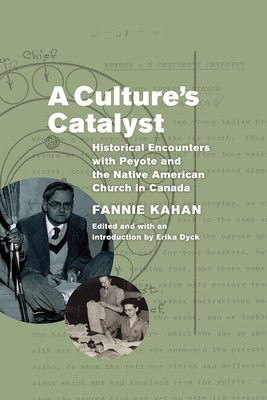
- We will send in 10–14 business days.
- Author: Fannie Kahan
- Publisher: University of Manitoba Press
- ISBN-10: 0887558143
- ISBN-13: 9780887558146
- Format: 15.2 x 22.4 x 1.5 cm, minkšti viršeliai
- Language: English
- SAVE -10% with code: EXTRA
Reviews
Description
In 1956, pioneering psychedelic researchers Abram Hoffer and Humphry Osmond were invited to join members of the Red Pheasant First Nation near North Battleford, Saskatchewan, to participate in a peyote ceremony hosted by the Native American Church of Canada. Inspired by their experience, they wrote a series of essays explaining and defending the consumption of peyote and the practice of peyotism. They enlisted the help of Hoffer's sister, journalist Fannie Kahan, and worked closely with her to document the religious ceremony and write a history of peyote, culminating in a defense of its use as a healing and spiritual agent. Although the text shows its mid-century origins, with dated language and at times uncritical analysis, it advocates for Indigenous legal, political and religious rights and offers important insights into how psychedelic researchers, who were themselves embattled in debates over the value of spirituality in medicine, interpreted the peyote ceremony. Ultimately, they championed peyotism as a spiritual practice that they believed held distinct cultural benefits. "A Culture's Catalyst" revives a historical debate. Revisiting it now encourages us to reconsider how peyote has been understood and how its appearance in the 1950s tested Native-newcomer relations and the Canadian government's attitudes toward Indigenous religious and cultural practices.
EXTRA 10 % discount with code: EXTRA
The promotion ends in 22d.00:15:18
The discount code is valid when purchasing from 10 €. Discounts do not stack.
- Author: Fannie Kahan
- Publisher: University of Manitoba Press
- ISBN-10: 0887558143
- ISBN-13: 9780887558146
- Format: 15.2 x 22.4 x 1.5 cm, minkšti viršeliai
- Language: English English
In 1956, pioneering psychedelic researchers Abram Hoffer and Humphry Osmond were invited to join members of the Red Pheasant First Nation near North Battleford, Saskatchewan, to participate in a peyote ceremony hosted by the Native American Church of Canada. Inspired by their experience, they wrote a series of essays explaining and defending the consumption of peyote and the practice of peyotism. They enlisted the help of Hoffer's sister, journalist Fannie Kahan, and worked closely with her to document the religious ceremony and write a history of peyote, culminating in a defense of its use as a healing and spiritual agent. Although the text shows its mid-century origins, with dated language and at times uncritical analysis, it advocates for Indigenous legal, political and religious rights and offers important insights into how psychedelic researchers, who were themselves embattled in debates over the value of spirituality in medicine, interpreted the peyote ceremony. Ultimately, they championed peyotism as a spiritual practice that they believed held distinct cultural benefits. "A Culture's Catalyst" revives a historical debate. Revisiting it now encourages us to reconsider how peyote has been understood and how its appearance in the 1950s tested Native-newcomer relations and the Canadian government's attitudes toward Indigenous religious and cultural practices.


Reviews